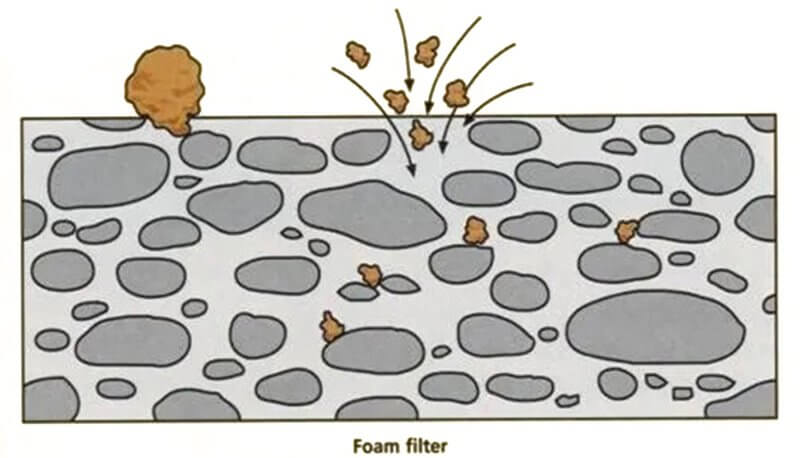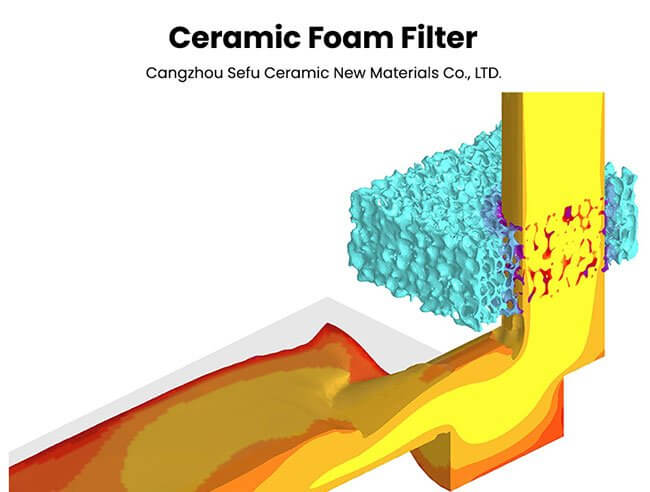Abstract:
This essay explores the application of silicon carbide (SiC) ceramic foam filters as high-temperature ceramic filters. The unique properties of SiC, such as high-temperature stability, chemical inertness, and excellent mechanical strength, make it an ideal material for filtration in extreme environments. The essay discusses the structure and manufacturing process of silicon carbide ceramic foam filter, their advantages, and their applications in various industries. Additionally, it highlights the importance of high-temperature ceramic filters in improving product quality, reducing defects, and enhancing process efficiency.
Silicon Carbide Ceramic Foam Filter: Enhancing Filtration Efficiency in High-Temperature Environments
High-temperature ceramic filters play a crucial role in various industries that operate in extreme environments. These filters provide an effective means of removing impurities and unwanted particles from molten metals, gases, and liquids, ensuring product quality and process efficiency. Among the various ceramic filter materials, silicon carbide (SiC) ceramic foam filters have emerged as an excellent choice due to their unique properties and numerous advantages.
This essay aims to explore the features and applications of SiC ceramic foam filters in high-temperature environments. It discusses the properties of silicon carbide, the structure and manufacturing process of SiC ceramic foam filters, their advantages, and their wide-ranging applications in different industries. Additionally, it emphasizes the significance of high-temperature ceramic filters in enhancing product quality, reducing defects, and improving process efficiency.
Properties of Silicon Carbide
Silicon carbide, a compound of silicon and carbon, possesses exceptional properties that make it well-suited for high-temperature applications. Its properties include high-temperature stability, chemical inertness, and excellent mechanical strength.
High-temperature Stability:
SiC exhibits remarkable thermal stability and can withstand temperatures exceeding 1,500 degrees Celsius without significant degradation. This property enables its use in extreme heat conditions, such as molten metal filtration or high-temperature chemical processes.
Chemical Inertness:
Silicon carbide is highly resistant to chemical attacks from various corrosive substances, including acids, alkalis, and molten metals. This chemical inertness ensures that the filter material remains unaffected by aggressive environments, allowing for efficient filtration without compromising filter integrity.
Mechanical Strength:
SiC possesses exceptional mechanical properties, including high strength, hardness, and resistance to mechanical wear. These attributes enable SiC ceramic foam filters to withstand the demanding conditions encountered during filtration processes, such as the pressure exerted by molten metals or abrasive particles.
Structure and Manufacturing Process of SiC Ceramic Foam Filters
SiC ceramic foam filters are characterized by their porous structure, which enhances filtration efficiency by trapping impurities while allowing the passage of the desired material. The manufacturing process involves several stages, including foam generation, shaping, sintering, and post-treatment.
Composition and Structure:
SiC ceramic foam filters consist of a three-dimensional network of interconnected SiC struts, forming a reticulated structure. This structure provides a high surface area for particle capture and promotes uniform flow distribution.
Foam Generation Techniques:
Various methods can be employed to generate the ceramic foam structure, such as the replica method, direct foaming, and sacrificial template method. These techniques involve the use of suitable precursors and pore-forming agents to create the desired porous structure.
Sintering and Post-treatment Processes:
After foam generation, the filters undergo sintering, during which the ceramic particles are fused together to increase their mechanical strength. Additional post-treatment processes, such as impregnation or coating, may be applied to modify the filter’s surface properties for specific applications.
Advantages of Silicon Carbide Ceramic Foam Filter
SiC ceramic foam filters offer several advantages that make them highly desirable for high-temperature filtration applications:
Enhanced filtration efficiency:
The interconnected porous structure of SiC ceramic foam filters provides a large surface area for capturing impurities, resulting in improved filtration efficiency. The controlled pore size distribution allows for the effective retention of unwanted particles while minimizing pressure drop.

High-temperature Resistance:
SiC filters exhibit exceptional thermal stability and can withstand high temperatures without significant degradation. This property enables their use in extreme heat environments, including molten metal filtration in foundries and steelmaking processes.
Chemical Resistance:
Silicon carbide is chemically inert, allowing the filters to maintain their structural integrity and performance even in highly corrosive environments. This chemical resistance makes SiC ceramic foam filters suitable for filtration processes involving aggressive chemicals or molten metals.
Mechanical Strength:
SiC possesses excellent mechanical properties, including high strength and hardness, which contribute to the durability and longevity of ceramic foam filters. Their robustness allows them to withstand the challenges posed by high-pressure and abrasive filtration processes.
Improved Flow Rate and Reduced Pressure Drop:
The interconnected porosity of SiC ceramic foam filters enables efficient fluid flow while minimizing pressure drop. This property enhances the filtration process by maintaining consistent flow rates and reducing energy consumption.
Applications of Silicon Carbide Ceramic Foam Filter
SiC ceramic foam filters find applications in various industries that require high-temperature filtration:
Metal Casting Industry:
SiC filters are widely used in the metal casting industry to remove impurities, such as oxides, slag, and non-metallic inclusions, from molten metals. They contribute to improved product quality, reduced defects, and enhanced casting process efficiency.
Foundry Applications:
Foundries utilize SiC ceramic foam filters to achieve cleaner castings with reduced porosity and improved mechanical properties. The filters effectively capture impurities, ensuring the production of high-quality metal components.

Steelmaking and Aluminum Production:
SiC filters play a crucial role in steelmaking and aluminum production processes. They remove impurities and solid particles from molten metal, preventing defects and enhancing the mechanical properties of the final products.
High-temperature Filtration in Chemical Processes:
SiC ceramic foam filters are employed in high-temperature chemical processes, such as the filtration of aggressive chemicals or catalyst recovery. They enable efficient separation and purification of substances while withstanding the demanding conditions of these processes.
Case Studies
Several case studies highlight the successful implementation of SiC ceramic foam filters in industrial settings:
Implementation of SiC ceramic foam filters in an aluminum foundry:
By using SiC filters in the aluminum casting process, the foundry observed a significant reduction in casting defects and improved dimensional accuracy. The filters efficiently captured inclusions and impurities, leading to enhanced product quality.
Impact on product quality and defect reduction in steelmaking:
In a steelmaking plant, the use of SiC ceramic foam filters resulted in a notable decrease in inclusions and defects in the final steel products. The filters effectively removed non-metallic impurities, contributing to improved mechanical properties and higher customer satisfaction.
Process efficiency improvements in a chemical plant:
A chemical processing plant incorporated SiC ceramic foam filters for high-temperature filtration of aggressive chemicals. The filters facilitated efficient separation, allowing for higher purity levels and reduced product loss. Additionally, the filters exhibited excellent resistance to chemical corrosion, ensuring long-term performance.
Future Developments and Challenges
The future of SiC ceramic foam filters holds several possibilities and challenges:
Advancements in SiC filter technology:
Ongoing research and development efforts aim to improve the performance and durability of SiC filters. Innovations in manufacturing techniques, pore structure design, and surface modifications can further enhance their filtration efficiency and extend their range of applications.
Expanding the range of applications:
Efforts are being made to explore the use of SiC ceramic foam filters in new industries and processes. SiC filters can potentially find wider applications in diverse high-temperature filtration scenarios.
Conclusion
High-temperature ceramic filters, particularly silicon carbide ceramic foam filters, play a vital role in improving product quality, reducing defects, and enhancing process efficiency in industries operating in extreme environments. SiC ceramic foam filters offer unique properties, including high-temperature stability, chemical inertness, and excellent mechanical strength, making them ideal for high-temperature filtration applications.
The interconnected porous structure of SiC filters enhances filtration efficiency, while their ability to withstand high temperatures and resist chemical corrosion ensures long-term performance. SiC ceramic foam filters have found applications in metal casting, foundries, steelmaking, aluminum production, and high-temperature chemical processes.
In conclusion, silicon carbide ceramic foam filters have proven to be a valuable tool in high-temperature ceramic filtration, providing effective particle capture, improved product quality, and enhanced process efficiency. The continued exploration and refinement of SiC filter technology will undoubtedly lead to further advancements in high-temperature ceramic filtration in the future.


